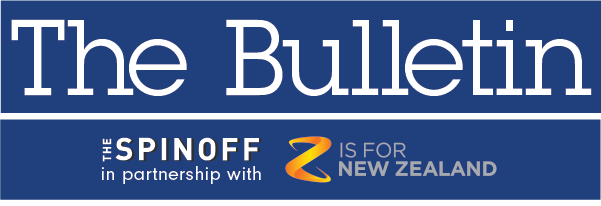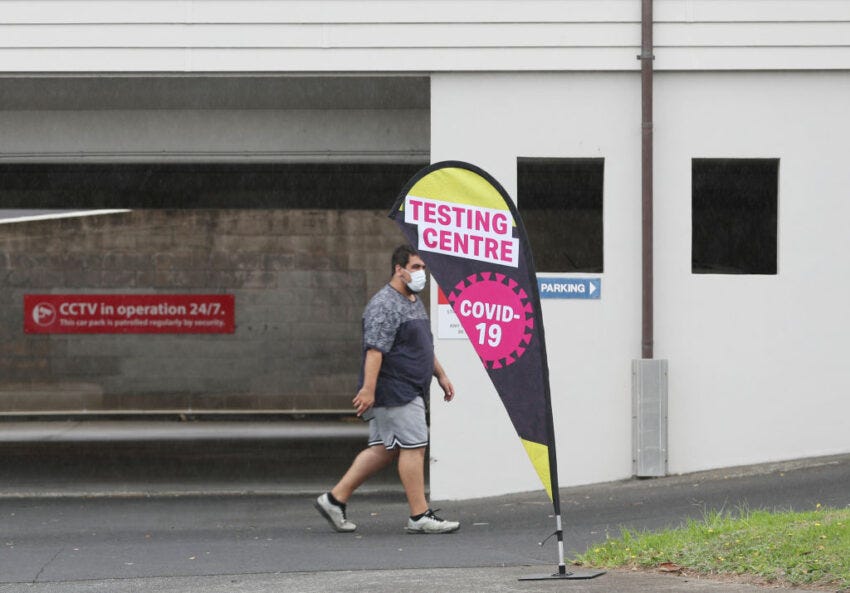New testing strategy aimed at borders, community surveillance
Health experts say there is a lot to like about the strategy, but are concerned resources will be spread too thin

Good morning and welcome to The Bulletin for Wednesday 24 June, by Alex Braae for The Spinoff. Presented in partnership with Z Energy.
In today’s edition: New testing strategy unveiled by minister, Otago Regional Councillors preparing for leadership showdown, and PM dismisses Ihumātao reports

Image: A Covid-19 testing clinic in Auckland (Greg Bowker/Getty Images)
Every person known to have Covid-19 right now is in quarantine, including the two new cases at the border yesterday. With that said, Radio NZ's Rowan Quinn reports the new cases over the last week mean that community testing centres have had to keep going. This story, and a follow up on Checkpoint, indicate that demand is very high right now for tests – partly because people are more likely to be getting colds right now, and partly because of the concern around new cases – which to reiterate are all related to the border.
As our live blog reported yesterday, the country's overall testing regime will be stepped up, particularly targeted at those who work in and around airports and quarantine hotels – but also for anyone presenting with related symptoms. It's part of a new testing strategy unveiled by health minister David Clark. The community testing of anyone with symptoms is described as "important for surveillance purposes" by Clark, in other words, ensuring that there is no community transmission taking place.
There won't be any change to the policy of testing of people in managed isolation on days three and 12 of their stay. There has been some conjecture that everyone should be tested the moment they step off the plane, but that wouldn't necessarily help as it may still be too early in the incubation process for the virus to show up, and even if a positive test came back it's not like we could just chuck returning New Zealanders on a flight back out, or take them anywhere other than the facilities that already exist.
There has been some concern about the new testing strategy from health experts, reports Newshub. The worry is that by taking in everyone with symptoms – regardless of overseas travel links or close contacts with an infected person – too much of a limited resource will be diverted away from where it is most needed. Otago University's associate professor Lynn McBain said it was a good step to enhance testing of anyone connected to the border, because at this stage it's still by far the most likely source of Covid-19 cases. But she was also concerned that the community testing guidelines were too broad. Opinion on this point isn't necessarily unanimous, but it underscores one point – it is very unlikely that there is undetected community transmission out there.
Are there other means of testing that can be used? To a degree, but they're not necessarily useful for detecting whether an individual has Covid-19 at a particular moment. This Newsroom article has some interesting details around two such methods. The country's national laboratory service ESR is able to test sewage, which overseas has been a useful mechanism for determining whether undetected outbreaks are happening. And Dr Ashley Bloomfield also cast doubt on the "rapid, point-of-care tests that can return a result for individuals in 15 minutes to an hour" that have also been used overseas, on the grounds that they aren't accurate enough for what New Zealand needs – they're more useful if there is already widespread community transmission.
Just quickly, a message from The Spinoff's managing editor Duncan Greive:
"The arrival of Covid-19 and lockdown changed The Spinoff, transforming our editorial to focus on the biggest story of our lives, taking a small team and making it a seven day a week news operation. But it also fundamentally changed us as a business, too. Prior to the crisis, around 20% of our editorial costs were funded by our Members. Now, that figure is north of 50%. The loss of some key commercial clients meant that change has to be permanent. If you're already a member, please know that all at The Spinoff are incredibly grateful for your help. If you're not, and can afford to contribute, please consider doing so – it really is critically important to our ability to cover the next phase of the crisis, in all its complexity."
Otago Regional Councillors will throw down at a meeting today over whether former MP Marian Hobbs should remain as chair. The ODT's Molly Houseman reports that a challenge is going to be mounted, with deputy chair (and another former MP) Michael Laws saying it is because of an irredeemable clash of personalities between Hobbs and the rest of the board. Hobbs, by contrast, says those attempting to oust her are doing so to block efforts to observe National Policy Statements on freshwater quality. One of Hobbs' few councillor supporters, Alexa Forbes, spoke to Crux and backed that view up. According to the ODT report, it looks like the numbers are against Hobbs, but rest assured, we'll definitely be updating this yarn tomorrow.
The PM has called reports from earlier in the week about a resolution being close at Ihumātao as "inaccurate", reports Newshub. She wouldn't confirm that particular report, and also questioned the reported timing of when she got involved with the negotiations, saying that happened much earlier. "When we have an announcement to make we'll obviously make it," she said, meaning that anything final could still be a while away. Or it could also be very close, as it's an issue that hasn't panned out according to earlier predictions.
Following up on yesterday's story about Auckland's drought and water shortages, there's some bad news about one potential saviour. The NZ Herald has reported on a new long range forecast, which is picking the second half of the year to also be drier than average. Given that any water from the Waikato would still be a long time away, it means there's really only one solution to the problem – much lower water use.
A big story in the world of cyber-crime: Interest reports that the police have restrained $140 million in funds relating to the Canton Business Corporation, a shell company involved in a bitcoin exchange platform. The charge is that the platform was allegedly being used for money laundering of the proceeds of crime. The case is an international one, with a range of charges also filed in the US.
The Opportunities Party has announced a plan to abolish the provisional tax system if they're elected in September. A release on their tax plan can be found here, but effectively the party's view is that it's "unfair, disliked and misunderstood by the majority of small business owners.” They're also reiterating their call for a Universal Basic Income, which has increasingly become one of the main planks of the party's policy platform.
A few points of clarification: Earlier in the week, a number of 2400 was given for how many people had left managed isolation without being tested. We don't actually know if that number is true or not, because according to Dr Ashley Bloomfield, nobody knows the actual number. One would think it would be an important thing to find out, and by all accounts MOH staff are doing so. And as for the allegation made by National MP Michael Woodhouse that a homeless man enjoyed two weeks free room and board in a quarantine hotel – Bloomfield says the MOH can't find any evidence of that. Stuff reports Woodhouse is standing by his story, and says it came from a reliable source. Minister Megan Woods has since asked for proof, which to be honest probably wouldn't be forthcoming anyway because of source protection, so surely that'll be the end of the matter.
Something to listen to, if you share my passion for minor party politics: The Detail invited both me and satirist Ben Uffindell in to talk about the state of play leading up to the election – he of course actually has experience of setting a party up from scratch. It gives a good outline of just how tough it'll be for these parties outside of parliament to push their way in at September's election.
Got some feedback about The Bulletin, or anything in the news?
Drop us a line at thebulletin@thespinoff.co.nz

Right now on The Spinoff: Bailey Mackey argues that Māori TV has outlived its usefulness, and needs to be replaced with something that sits more where its potential audience is. Trevor McKewen gives a view of the much tougher hotel quarantining system in place in Queensland compared to New Zealand. Sam Brooks writes about the 20 year legacy of the game some believe is the greatest of all time. Elizabeth Heritage gives a personal review of Funkhouse, a new poetry collection from Hinemoana Baker. Josie Adams speaks to band The Naked and Famous about trying to do things differently to other indie musicians, and how Covid-19 has hit them in Los Angeles. Henry Burrell reviews the current slate of Android phones on the market.
And this is very exciting – there are brand new episodes of On the Rag coming out, and the first one is about the murky world of wellness and influencers. It's awesome to see Alex Casey back on the site too.
For a feature today, an excellent example of the kōrero interview format, which may well have been perfected by E-Tangata journalist Dale Husband. On one level it's a Q and A with an interesting person, and on another level it is the retelling of a life story and whakapapa, and the changes that person has seen on their journey. The guest in this instance is Family Court judge Robyn von Keisenberg, who grew up 'afakasi in New Zealand, in a time of great cultural change. Here's an excerpt, starting at a time before she was aware of racial disparities:
I never thought anything of it. That’s the oddest thing. Because it was so much part of your everyday life in the playground, and I had a Sāmoan mother, it never dawned on me until much later. I certainly remember the land march. And my father was often lending a hand at the marae. For instance, helping on the board and fundraising. I remember joining the Vietnam peace march. My mother was horrified that we had peace signs from the Cook Street market around our necks. But that was our protest.
I often felt I was just on the fringes because I was about 18 to 24 months younger than most of the students in my year, so I was just getting on with it. I don’t remember Māori incarceration rates being discussed even in the criminal law and criminology courses I did.
In sport, an analysis of the current state of rugby, and the loss of one of rugby's centrepiece features. Well, not the loss exactly, but as Scotty Stevenson argues, the scrum has largely been stripped out of games in Super Rugby Aotearoa so far. Does that matter? It's a matter of opinion, but one of the great things about sport being back is we can have these sorts of arguments.
That's it for The Bulletin. If you want to support the work we do at The Spinoff, please check out our membership programme




